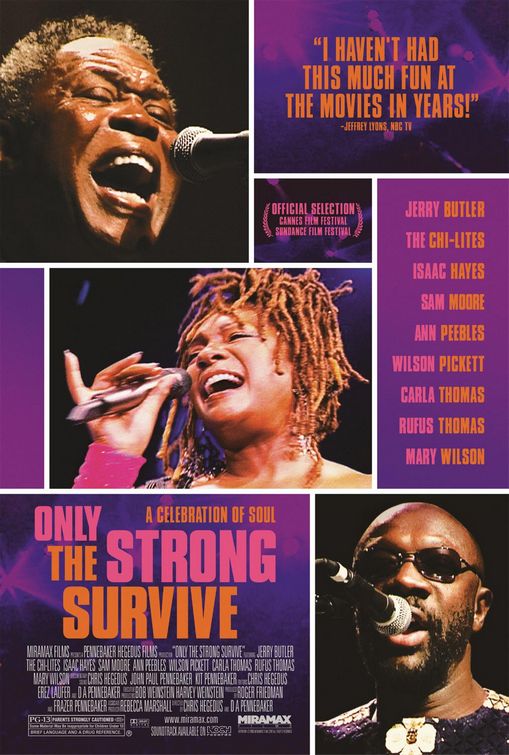
| None | Light | Moderate | Heavy | |
|---|---|---|---|---|
| Language | ||||
| Violence | ||||
| Sex | ||||
| Nudity |
Content:
(Pa, B, L, A, D, M) Mixed worldview with worldly portrayals of musicians running after stardom and worldly acclaim, many of them finding, however, that it’s fleeting, and several biblical worldview portrayals with one singer’s wife telling about keeping the devil out of her husband’s life and thus freeing him from drugs, and some musicians saying things like, “God bless you, brother,” and film’s producer is interviewed and lauded for getting things done and getting into places because he’s Jewish (hinting at the blessing of Abraham and the favor of God’s chosen); about nine light obscenities, some within song lyrics; some mild portrayals of alcohol and smoking, with some portrayals and talk of drug history, but drug lifestyle is rebuked; and, questionable element when one of the singers pulls a large woman out the audience and dances with her, stomach to stomach.
GENRE: Documentary/Musical
Pa
B
L
A
D
M
More Detail:
Isaac Hayes then interviews Sam Moore (“Soul Man”) on a radio show. The two laugh as they reminisce about the many decades they’ve been friends in show biz. Isaac calls Sam by his nickname, “Blessed.” Sam takes the production team on a tour of his old stomping grounds in the city of Chicago, where he used to sell cocaine and heroin, he says. His wife tells the story of how she realized one day that it wasn’t her husband but the demons of drugs that were messing up his life. She decided to take control of matters, including his money and schedule, exercise some tough love and fight the devil on her husband’s behalf. Sam reiterates that his name is blessed and that he is grateful to be clean since the early ’80’s. “Hallelujah,” they say.
Mary Wilson, or “Queen Mary,” is interviewed next. She was one of the original “Supremes” with Diana Ross and now tours alone, singing “Love Child” and the other famous oldies with her own backup singers. She talks about how she’s getting a bachelor’s degree at NYU now, and how proud her parents would be, as they never learned to read or write.
The documentary goes on to interview many of the old R&B greats – William Bell, Jerry Butler, the Chi-Lites, Ann Peebles, Sir Mack Rice, Carla Thomas, and Rufus Thomas. Many of them still sing at concert halls, and they all have great stories to tell. One singer tells about how he thought Diana Ross was the most ugly girl he’d ever met, and how he and his friends would make her ride in the back of the station wagon. He laughs about how ironic it is that she turned out to be one of the most beautiful women in America. Another singer tells the story about how he sang at a concert and wandered into the audience, only to find Aretha Franklin hiding among the fans. She obliged him by getting up and singing with him, making it a terrific show.
Friedman tours the old Stax Records in Chicago, which went bankrupt in 1975, but which turned out many of the great R&B stars throughout the years. Some fun Otis Redding footage shows the high energy and appeal that country blues and folk soul had on mid-20th century America. The Shadowlights are interviewed and they talk about how much they loved their colorful uniforms of the 1970s. They sing “Have You Seen Her?” Finally, Jerry Butler, now in politics as a Chicago Cook County Commissioner, sings his famous song, “Only the Strong Survive.”
Screening at the Sundance Film Festival last year, and coming to U.S. theatres in May, this documentary highlights the olden days with some rare old footage and shows the present – with its concerts, its memories, and the bittersweet passage of time that brings ageing, sparser crowds, and some regrets along the way. Its grainy, 16-mm feel is typical of most documentaries, and the production quality is very average, but the “story” moves pretty well and highlights some interesting characters. With a mixture of worldly and biblical outlooks, the movie may have a narrow appeal to only those interested in rhythm and blues, but those who do enjoy the soul stars of yesterday may find it entertaining.
Please address your comments to:
Bob and Harvey Weinstein
Co-Chairmen
Miramax Films
375 Greenwich Street
New York, NY 10013
Phone: 323.822.4100 and 212.941.3800
Fax: 212.941.3846
Website: www.miramax.com


 - Content:
- Content: 



